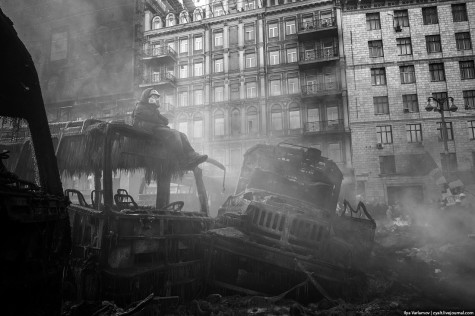Ukraine protesters force president to flee capital
Riot shields and tanks were no match for the Ukrainian revolutionaries who forced President Viktor F. Yanukovych to flee Kiev on Feb. 22.
Clashes between protesters, labeled “terrorists” by the government, and Ukraine’s military began in November when Yanukovych rejected an economic partnership with the European Union and sought assistance from Russia.

Many in the nation’s anti-Russian Ukrainian-speaking region were infuriated by the deal, seeing it as a return to the Soviet Union and all of the oppression that comes with it.
While the rapid pace of events in Kiev seems shocking to outsiders, it may simply be part of Ukraine’s rapidly growing internal conflict.
Since its independence from the Soviet Union in 1991, the Ukraine has been plagued with tensions between Ukrainian nationalists and pro-Russian combatants, reminiscent of the conflict between American patriots and pro-British loyalists after the American Revolution.
Olga Khrustaleva, a 26-year-old Fulbright scholar now studying at the University of Missouri, said protesters reflect a sense of pessimism about the future.
“I don’t think (the protests) are about joining the European Union,” said Khrustaleva, who is from from Ryazan, Russia. “People are just tired of having a government that doesn’t represent them. There is a lack of perspective and a lack of hope.”
While protesters in Kiev celebrated parliament’s unanimous decision to remove Yanukovych from office and the surrender of much of the military to protestors, a full-scale civil war may be building.
Though Yanukovych may no longer be recognized by many as the president, he and his supporters in the East —as well as Russian President Vladimir Putin, who has been busy at the Olympics in Sochi — are still determined to maintain control of the country.
In a television appearance recorded in eastern Ukraine on Feb. 22 and reported by The Guardian, Yanukovych said, “They are trying to scare me. I have no intention of leaving the country. I am not going to resign, I’m the legitimately elected president.”
“Everything happening today is, to a large extent, vandalism and banditry and a coup d’état,” Yanukovych was quoted as saying. “I will do everything to protect my country from breakup, to stop bloodshed.”
However, the Ukraine’s defense minister, who has up to this point remained loyal to Yanukovych, announced on Saturday that the military would not “use arms against the Ukrainian people.”
Though the Ukraine is in the headlines, many Urban students appear unaware of events there.
“I don’t know what’s going on, but I do care and I really try to stay up-to-date on current events. I really just don’t have a lot of time to read the news because of how much homework and SAT work I have,” said Emily Miller (’15).











